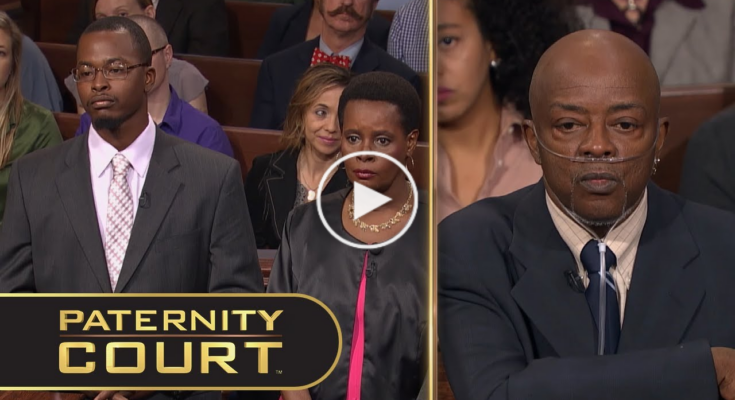In the case of Norris v. Norris, the courtroom witnessed a gripping and emotionally charged paternity dispute that captivated the hearts of the audience. The story revolves around Ms. Annie Norris and Mr. Johnnie D. Norris Sr., whose lives were intertwined by a 30-year-old son, Johnnie Jr. This article delves into the poignant transcripts of the court proceedings, highlighting the power of DNA evidence and the complexities of human emotions.
The courtroom atmosphere was tense as the judge inquired, “How did you find out that your husband might have a son?” Beverly, Mr. Norris Sr.’s current wife, revealed, “I heard rumors through the years and, um, I checked it out myself. I got on Facebook and I contacted his son.”
Beverly’s confession unveiled a hidden truth that rocked the foundations of their marriage. “I was devastated. The trust, everything,” she confessed, revealing the impact of her discovery. The tension in the courtroom escalated, hinting at a long-awaited revelation.
As the court proceedings continued, Mr. Norris Sr. reminisced about his past with Annie. “It was a shotgun wedding, Your Honor,” he explained. “I was kind of forced into it due to the circumstances, but I loved her at the time.”
Amidst emotional exchanges, Ms. Norris interjected, asserting that Mr. Norris Sr. acknowledged their son in the early years. “He never denied he was my son. When she said he wasn’t my son… That put a dagger in my heart because I was a young man, and I felt like, you know, this is my first kid and he’s a boy,” Mr. Norris Sr. recalled.
The absence of Mr. Norris Sr. in Johnnie Jr.’s life significantly affected the young man’s emotions. “On the subject of my father not being there, it induced a great deal of anger upon me,” Johnnie Jr. admitted. His rebellious behavior and emotional turmoil manifested from the void left by his absent father.
Years later, Ms. Norris decided to search for Mr. Norris Sr., seeking closure and confirmation. “I was like, ‘How can somebody just abandon him?'” she said. The search led to unexpected revelations about their marital status.
“I asked her had she divorced him, and she said no, broke my heart, but I knew it was the truth,” Beverly said of her conversation with Ms. Norris. The revelation shattered the trust she had in her husband.
The tension in the courtroom reached its peak as Judge Lake presented the DNA test results. “In the case of Norris v. Norris Jr. v. Norris Sr., when it comes to 30-year-old Johnnie B. Norris Jr… It has been determined by this court, Mr. Norris Sr., you are not his father.”
The truth finally surfaced, revealing a heart-wrenching reality for both families. Ms. Norris tearfully apologized to Johnnie Jr., expressing her genuine belief that Mr. Norris Sr. was his father.
While the court proceedings ended, the emotional journey for both families continued. The article emphasizes the significance of love and understanding in defining fatherhood, transcending biological relationships. It calls for counseling to help the families cope with the emotional aftermath and move forward positively.
Ms. Norris expressed her remorse, “I really thought he was your father. I love him, and I apologize to you, son.” Meanwhile, Mr. Norris Sr. grappled with the truth, “It hurts, Your Honor, because I named him after me. I’m shocked, totally.”
The case of Norris v. Norris sheds light on the complexity of family bonds and the profound impact absent fathers can have on their children’s lives. Johnnie Jr.’s journey illustrates the enduring emotional scars left by his father’s absence, while Mr. Norris Sr. faces the consequences of past actions and the need to confront his own regrets.
The court proceedings serve as a reminder that the search for truth is not just a legal matter, but a deeply emotional one that affects the lives of all involved. The revelation of paternity is a profound moment, impacting not only the individuals directly involved but also future generations.
As the families process the truth, counseling is essential in helping them navigate the emotional aftermath. Forgiveness, understanding, and open communication are crucial in building bridges and fostering healing for both the present and the future.
The courtroom drama of Norris v. Norris leaves a profound impact, highlighting the power of DNA evidence in resolving paternity disputes. Beyond the legal intricacies, the case serves as a reminder of the complexities of human emotions and the importance of compassion and communication in navigating delicate family matters.
In the end, the truth, though painful, offers the possibility of healing and reconciliation for all parties involved. The emotional journey of Norris v. Norris continues, but the power of love, understanding, and counseling can pave the way for a brighter, more united future. As we learn from this case, family extends beyond blood and DNA, encompassing a tapestry of emotions, memories, and shared experiences that define us all.



